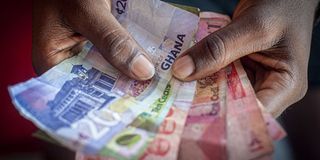Ghana suspends part of foreign debt payments

What you need to know:
- The West African state is facing an economic crisis with inflation at more than 50 percent and its cedi currency down sharply, hit by the adverse effects of the global pandemic and Ukraine crisis.
Ghana suspended payments on part of its foreign debt on Monday as the country undertakes debt restructuring in line with a bailout deal with the International Monetary Fund (IMF).
The West African state is facing an economic crisis with inflation at more than 50 percent and its cedi currency down sharply, hit by the adverse effects of the global pandemic and Ukraine crisis.
"That is why we are announcing today a suspension of all debt service payments under certain categories of our external debt, pending an orderly restructuring of the affected obligations," the finance ministry said in a statement.
"This suspension will include the payments on: our Eurobonds; our commercial term loans; and on most of our bilateral debt," it said.
The government however said the suspension would exclude payments of multilateral debt, new debt (whether multilateral or otherwise) contracted after December 19, 2022 or debts related to certain short-term trade facilities.
"We are also evaluating certain specific debts related to projects with the highest socio-economic impact for Ghana which may have to be excluded," it said.
Once seen as an investor favourite, Ghana struggled recently with its debt burden. The government spends more than half of its revenues on debt servicing. The fall in the cedi increased debt values by $6 billion just this year.
The government said the foreign debt payment suspension was an interim emergency measure pending future agreements with the country's creditors.
It also promised to engage with all of its external creditors to make Ghana's debt sustainable.
Last week, Ghana agreed on a $3 billion credit deal with the IMF to tackle its economic crisis.
Although the three-year loan has yet to be approved by the fund's board, the programme aims to reduce inflation, strengthen the economy's resilience to external shocks and improve market confidence in the country.
A top cocoa and gold producer, Ghana also has oil and gas reserves, but its debt has soared and like the rest of sub-Saharan Africa it has been hit hard by fallout from the Covid pandemic and the Ukraine war.
The crisis forced President Nana Akufo-Addo's government to reverse its position earlier this year and seek IMF help as economists warned of a default on debt payments.
The government has already announced a domestic debt swap as part of the programme to ease a crunch in payments and was soon expected to release details about restructuring foreign debt





